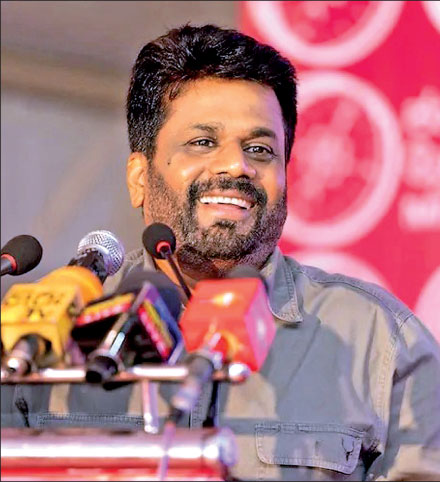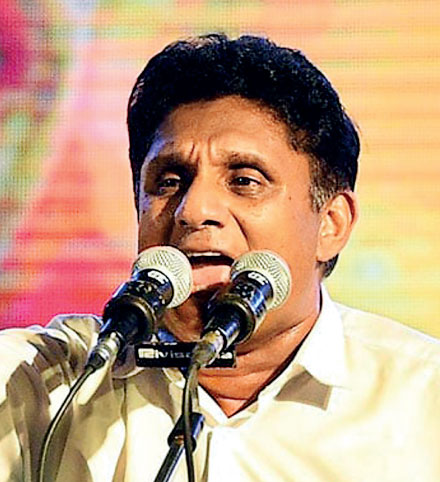Tuesday Feb 17, 2026
Tuesday Feb 17, 2026
Monday, 6 May 2024 00:42 - - {{hitsCtrl.values.hits}}

NPP Leader Anura Kumara Dissanayake

SJB Leader Sajith Premadasa
|
 A debate suffering from Balagiri Dosha
A debate suffering from Balagiri Dosha
The two main opposition parties, National People’s Power or NPP and Samagi Jana Balawegaya or SJB, have locked horns in a call for a pointless debate to prove the superiority of the economic policy wisdom possessed by each. To make matters worse, the debate gets postponed each day, drawing the sarcastic Sinhala proverbial qualification, the ‘Balagiri Dosha’ meaning that the thing will happen tomorrow and not today. Since tomorrow will never come, it is a non-event.
No winners in political debates
Such debates are useful and productive at a time of an election among the contesting candidates. It will give an opportunity to voters to choose the wisest because that memory is fresh on their mind when they go to the polling station. For instance, the public debate which was conducted in four rounds between John F. Kennedy and Richard Nixon in 1960 is reported to have given a wide margin of preference to Kennedy at the Presidential poll. In Sri Lanka, there is no presidential election, and the proposed debate is too early to create a lasting impression on the voters.
Besides, there are no winners in these debates and both debaters will emerge as losers. The only winner will be the non-participating Presidential hopeful, President Ranil Wickremesinghe, whose wisdom is not being tested here. Hence, it is more productive for the two warring opposition parties to spend their energy for learning the true nature of the economic issue and challenge the government party presidential candidate when the elections have been announced.
Central Bank’s message to political leaders
As a prelude to this, the new Annual Economic Review 2023, successor to the previous famous annual report, issued by the Central Bank a few days ago will be a useful starting document. It is essential for political parties to make a critical assessment of what the Central Bank has said because it is that presentation which will be adopted by the government party presidential candidate in his policy package.
In the executive summary of the report, the Central Bank has presented the issue at hand as follows: “While continuing the implementation of much needed institutional and policy reforms aimed at enhancing productivity and efficiency, the Government is expected to strive with its fiscal consolidation efforts to ensure the transition of the economy towards a sustainable path. However, the formidable recovery of the Sri Lankan economy hinges on the continuity of the reforms implemented thus far, and as part of this process, the successful continuation of the IMF-EFF arrangement and completion of the debt restructuring process remain paramount. Since the country has not fully exited the crisis, there is no space available for any slippages from the committed path. Recent experiences proved the devastating socioeconomic costs of uncharted policy experiments. Moreover, backtracking from the implemented and planned critical reforms will tip the economy to a state of instability. Thus, continuing with the broader political and social consensus on economic reforms will be critical to avoid recurring policy reversals and resultant economic downturns, to ensure uplifting the welfare of the general public through sustained growth.”
Enhancement of productivity and efficiency
The Central Bank’s technical analysis presented in technical terms can be represented in simple language for the benefit of ordinary readers as follows: The country is still not out of the woods and the continuing low performance in the economy is a worrisome feature. It is necessary to get out of the crisis eliminating all its symptoms and put the country back to a long-term growth path. That will bring prosperity back to people. Two key requirements are ensuring enhancement of productivity and efficiency. Productivity means getting a higher output for the same inputs and efficiency means attaining the same at the lowest cost. For instance, if 100 people produce 100 shirts now, environment should be created for the same 100 people to produce a bigger quantity, say 200, but without increasing the costs unnecessarily. If a shirt costs Rs. 100 now, the same average cost should remain unchanged too. If a different production mix can reduce the average cost, then that mix should be adopted.
Role of inventions and innovations
Though the Central Bank has not mentioned it, it means creating inventions that will lead to a reduction in the average cost. But inventions alone do not help the economy unless they are adopted by producers by a process known as innovations. Therefore, the institutional and policy reforms which the Central Bank has mentioned should generate enhanced productivity and efficiency through supportive inventions and innovations. This must be the prime objective of the policy reforms. It is the key to push the country back to a sustainable development path, a path which the country has once entered does not have the risk of being displaced. All the present and future Government policies should be geared to attaining this goal. If any policy is contradictory to this goal, it should be immediately noted and removed. It is those contradictory policies that stand in the way of attaining a sustainable growth.
Central Bank’s advice: continue with IMF policy
Then the Central Bank has said emphatically that whatever the Government that comes to power after elections should continue with the current stability policies adopted under the Extended Fund Facility or EFF of the International Monetary Fund or IMF. This policy package involves the following: first, the untamed budget should be cut to size by increasing the revenue factor, a strategy known as ‘revenue based fiscal consolidation’. Another is the restructuring the state-owned enterprises or SOEs by adopting a cost-based pricing policy and taking measures to improve their internal operational efficiency and productivity. A third is to adopt good governance policies as recommended in the governance diagnostic study completed by an IMF team in September 2023. A fourth is the adoption of a social safety network for the vulnerable groups, obviously those who have not been able to keep pace with the other reforms mentioned above.
The other policies are relating to the Central Bank like the one for keeping inflation under control through an appropriate monetary policy package, keeping the exchange rate stable by adopting a market-based exchange rate system, making laws relating to the Central Bank and financial institutions updated, and changing into a more suitable inflation targeting system. The Central Bank has completed all these requirements. The policy still remaining uncompleted is the restructuring of the selected central government external debt obligations.
|
Pitfalls of revenue based fiscal consolidation
The strategy involving the revenue-based fiscal consolidation is one sided because it ignores the more suitable approach for Sri Lanka involving a mixture of a ‘revenue-increasing and expenditure economising’ policy. When the expenditure increases faster than the revenue, the budget gap expands continuously forcing the Government to introduce more and more stringent revenue measures. That is practically impossible to continue. Sri Lanka is already caught in this race.
It introduced an income tax enhancing program in late 2022 and expanded it to an extreme level in 2023. With respect to the value added tax or VAT, the earlier rate was 15% but it was later increased to 18%. These ad hoc revenue enhancing measures introduced from time to time to match the rising expenditure levels has delivered uncertainty to the country’s tax system. As a result, individual taxpayers as well as business firms have been unable to plan for the future. This is not a desirable state for sustainable economic growth.
Need for ensuring efficiency in SOEs
The Government has introduced a cost-based pricing policy for the main loss making SOEs. It is a good move because it passes the burden of losses to the consumers of those enterprises rather than getting the general taxpayers to bear it. These enterprises are now able to convert the losses to surpluses. However, one omitted fact is the need for improving efficiency in those enterprises to prevent them from passing their inefficiencies to consumers. The Central Bank has not highlighted it in its Annual Economic Survey 2023, but it is an urgent necessity.
Failing to adopt good governance practices
Sri Lanka has experienced a drastic deterioration of the adherence to good governance practices by the Government. Rule of Law has not been adhered, while the law and order has been applied only for the opponents. It was a situation like the popular slogan in Brazil that ‘to friends, everything and to opponents, strict application of laws’. People who are unable to make open protests against these injustices continue to bear them silently. It gives the false assurance to rulers that what they do is readily accepted by the citizens. However, it causes the social discontent to brew underneath, and it might come to surface at any time destroying the whole social and economic structure. It happened in 2022 when the concerned citizens rose against the Government in a popular uprising.
The result was the collapse of the Government led by Mahinda Rajapaksa and the unceremonious fleeing of the President Gotabaya Rajapaksa to a foreign country abandoning the position. It paved way for the lone opposition legislator Ranil Wickremesinghe to assume presidency. It is, therefore, in his interest to refrain from resorting to the type of undemocratic practices adopted by his predecessor. In the circumstances, when IMF announced that it would conduct a governance diagnostic study, the civic minded people were overjoyed. But when the implementation of the recommendations got postponed day by day, that joy has been converted to a distress. As mentioned above, it is not a good sign for a coherent society, a critical need for sustained economic growth.
|
Social safety nets
The conversion of the problem-ridden Samurdhi payment system to a more target-oriented Aswesuma program by the Government was a move to satisfy the need for introducing a proper safety network for the vulnerable groups. But the cash payments so made will provide only a temporary relief to them. To take them out of poverty permanently, it is necessary to equip them with income earning facilities. This is a neglected side of the current safety net program. The current cash payments and supply of a limited quantity of rice are to make them poorer trapping them to an inescapable poverty cycle.
Too short and too late foreign debt restructuring
As I argued in my previous article on foreign debt restructuring (available at: https://www.ft.lk/columns/Foreign-debt-restructuring-Too-late-and-too-short-to-get-out-of-the-debt-trap/4-761118), what is being targeted is too short due to the low coverage of the total country foreign debt of the country. That is because out of a total country debt of $ 58 billion, only $ 27 billion owed to bilateral and commercial creditors is being restructured. Hence, even after a proper debt restructuring, the country will not be able to come out of the foreign debt crisis. Even if it is done, it is now too late because it is getting postponed to a future date every time a debt negotiation is made. When the debt is restructured, Sri Lanka will have to commence repayment of past arrears and future debt instalments. It will be a severe drain on the low accumulation of usable foreign reserves by the Central Bank which stands at $ 3,400 million.
I also noted that the emerging high-risk situation would force Sri Lanka back to the situation in April 2022. In this case, Sri Lanka introduced stringent import and exchange controls and suspended the servicing of bilateral and commercial debt. The import and exchange controls referred to above are continuing albeit some selected controls have been removed. There is a pressure for the government to remove exchange and import controls. Since it is an election year, the government might choose to adopt them. However, if there are no adequate foreign exchange reserves available, there can be a repeat performance of the same again.
Uncontested winner of the debate
What this means is that the two rival opposition leaders should apprise themselves of the current economic conditions before they sit in a debate against each other. Without addressing the proper issues, any attempt at criticising the policies of the other will not help the voters. Since these political debates do not produce winners, it is likely that both will emerge as losers. In such a situation, the winner will be President Ranil Wickremesinghe who is not being tested by the voters in a popular public debate.
Why should the two political rivals in the opposition allow such an uncontested victory to their common enemy, the President, by engaging in a fruitless debate?
(The writer, a former Deputy Governor of the Central Bank of Sri Lanka, can be reached at [email protected].)